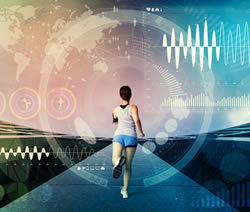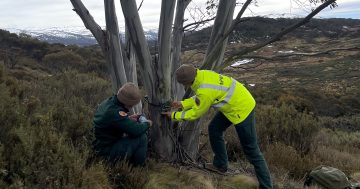Paul Biegler* says that sensor technology drawn from animal research could be used to track human health through our devices.

Image: Metamorworks
Unexpected findings from sensors implanted in animals, a practice known as biologging, should cause a seismic shift in how wearable sensors are used to promote health in humans.
That’s the conclusion of an international team of scientists from the Massachusetts Institute of Technology in the US, King Abdullah University of Science and Technology in Saudi Arabia, and others from Spain and Australia, in a perspective piece published in the journal ACS Sensors.
The group says animals have been fitted with sensors to measure just one or two behaviours, yet scientists have gained dramatic and unforeseen insights into a wealth of other habits.
A case in point is the jaw sensor.
To the uninitiated, this tiny device, which has been implanted in penguins, sea lions and dolphins, seems only able to know if the jaw is moving up or down.
But by drilling down on the size and frequency of signals, scientists have worked out when the animal is chewing, swallowing or capturing prey.
They also know how much and what type of food it eats and how long it feeds.
Which is fine and dandy if you’re interested in the gustatory habits of, say, the Northern rockhopper penguin.
But the scientists argue it is also of critical importance for the emerging science of wearable health monitoring, not least because most of us are already sensor-enabled.
“[R]oughly three billion people owned smartphones in 2018, effectively already being tagged with a subset of sensors,” Michael Lee and co-authors write.
Researchers have used smartphone tapping behaviour to predict Parkinson’s disease, analysed text and email data to detect depressed speech and even used the phone’s camera to measure heart rate by look at skin colour changes in the finger.
These are stunning advances, but many of them come from a very focused take on the data.
It is an approach, the authors argue, that could benefit from being a little less rigid and a little more laissez-faire.
They call their theory the “partial encoding hypothesis”.
The idea is that just about everything going on in the human body will be picked up in part by a sensor, in the same way that a sea lion’s prey is “partially encoded” by its jaw movements.
“To what extent does your daily activity, the rate and quantity of steps that you take, ‘partially encode’ markers of your health like blood sugar or cancer risk?” the authors ask.
But to nail the sea lion’s preferred dish you also need to know if it’s a carnivore, herbivore or omnivore.
Likewise, to join the health dots in humans, scientists are going to need to start combining disparate, or what the authors call “orthogonal”, datasets — ones where links aren’t initially suspected.
“Imagine simple devices that clip on to clothing that inform us about our eating habits, social interactions, respiration, sleep−wake cycles, heart rate, and oxygen levels,” they write.
Couple that with phone location data, pollution levels and your medical history and it is not inconceivable the risk of asthma or heart attack could be measured.
These are, of course, ideal questions in our era of big data and deep learning, where monolithic troves of sensor data can be trawled to find precisely those kinds of connections.
The process is only getting easier as devices get connected in the Internet of Things.
As the “connected person” becomes a central part of that web it may even, the authors suggest, get a new name.
“Turning this Internet of Things into an Internet of Health stands to benefit everyone if we think carefully about the machine/organism interface, regardless of whether one has legs or fins,” they conclude.
* Paul Biegler is a philosopher, physician and Adjunct Research Fellow in Bioethics at Monash University. He tweets at @pbiegler and his website is paulbiegler.com.
This article first appeared at cosmosmagazine.com.









